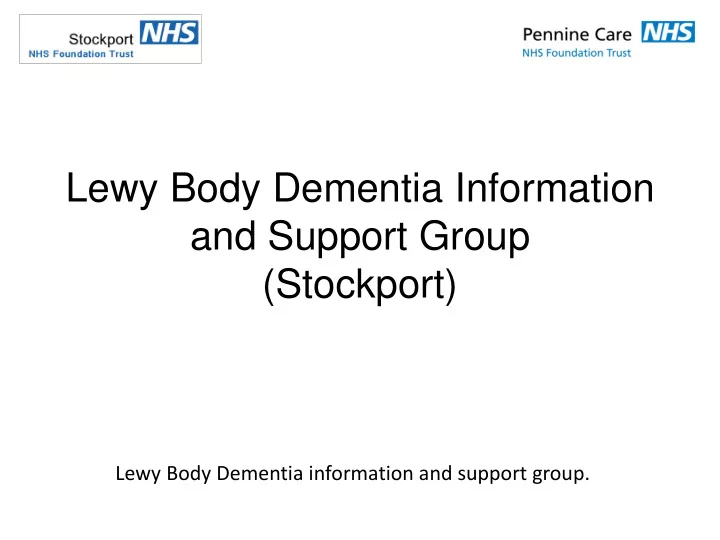

Lewy Body Dementia Information and Support Group (Stockport) Lewy Body Dementia information and support group.
Jenny Day Maria Curphey Parkinson’s Specialist Nurse Community Psychiatric Nurse (Stepping Hill Hospital NHS (The Meadows) Foundation Trust) Lewy Body Dementia information and support group.
Why The Group People with Lewy Body were falling between the gaps of current services. Lack of information and support specific to Lewy Body dementia Patients and carers were asking for additional support Lewy Body Dementia information and support group.
Need Intervention Outcome No specific Information group Information and information regarding commenced shared experiences Lewy Body dementia gained from the in Stockport group have helped patients and carers manage their condition Limited cohesion Links made and Joint effective between mental practice shared. partnership between health and acute Joint working acute and community services continues services Patients and carers Support group Support group meet highlighting the need identified as a need. every 4 months which for ongoing support Joint working to gives opportunity for for this complex establish and additional information condition continue it and peer support Lewy Body Dementia information and support group.
This project has had no funding This model could easily be replicated throughout the country Lewy Body Dementia information and support group.
Lewy Body Dementia • Dementia with Lewy Bodies (LBD) is the second most frequent cause of age related neurodegenerative dementia. • At least 5% of people aged 85 and older are thought to suffer from this (Lewy Body Society 2016). • People with Parkinson’s Disease are at a high risk of developing LBD due to presence of Lewy Body’s in the brain. • However, Lewy Body Dementia can develop in absence of Parkinson’s disease, but these patients will exhibit Parkinsonism eg Tremor, shuffling gait, confusion. Lewy Body Dementia information and support group.
Lewy Body Dementia Characteristics (diagnostic) • Hallucinations • Fluctuations in cognition and mobility • Parkinsonism • Sleep disturbances • Sensitivity to neuroleptics Lewy Body Dementia information and support group.
The Challenges • Patients with Parkinson’s usually require complex Parkinson’s treatment regimes, which can exacerbate Lewy Body Dementia symptoms, or even mimic them. • Without appropriate information and support, health professionals, patients and carers may be unaware of the complexities of the illness and subsequent treatment regimes Through the support group, patients and carers gain awareness, therefore influencing the care that the patient receives. Lewy Body Dementia information and support group.
Patient & Carer Feedback • “ The group gave us the opportunity to discuss the condition and receive appropriate information” • “The session was interactive involving carers views and I felt it was very relevant to me” • “It is important to have a group specifically for Lewy Body as it is very different from other Dementias.” • “The group was just the right size to be able to speak freely and be supported by each other” Lewy Body Dementia information and support group.
The Future • Continue to develop the information and support groups • Raise awareness of Lewy body dementia within care homes • Share this model with others. Lewy Body Dementia information and support group.
NHS England Transformation Network We feel in our individual roles and our joint working and through the development of the Lewy Body group we go some way in achieving the well pathway for dementia. Lewy Body Dementia information and support group.
Recommend
More recommend